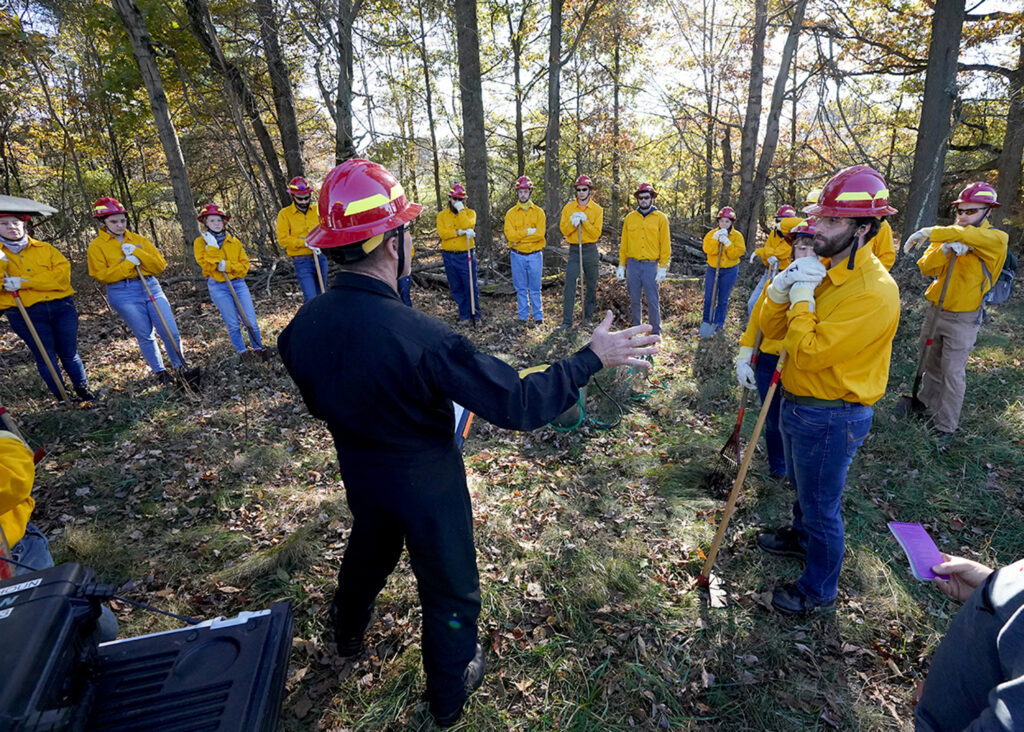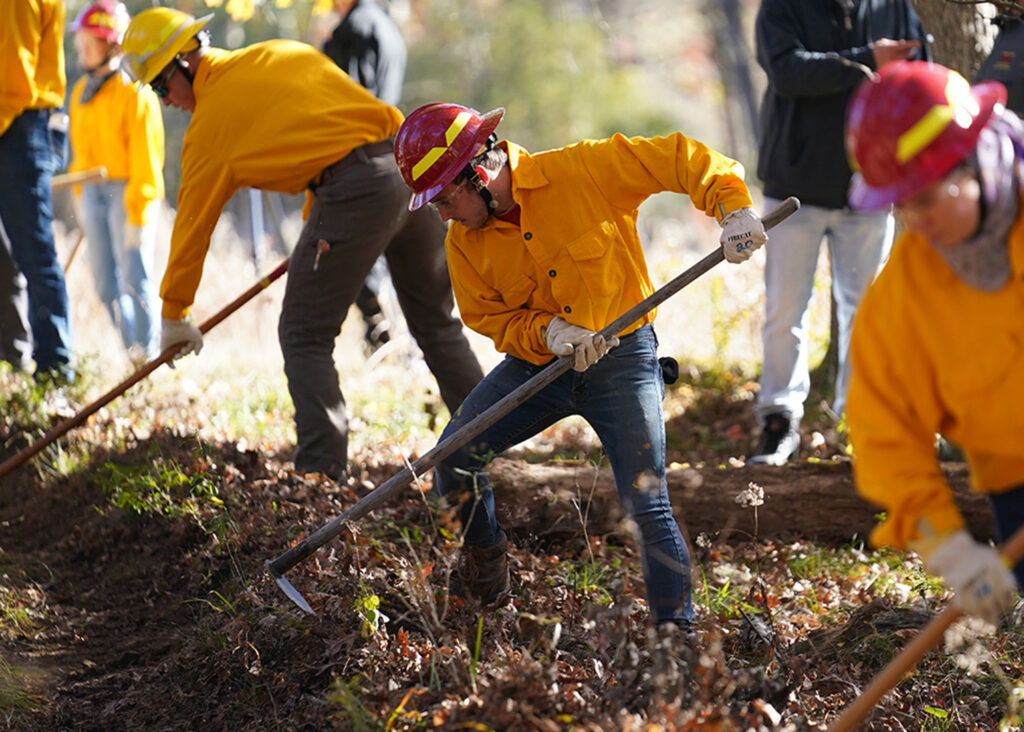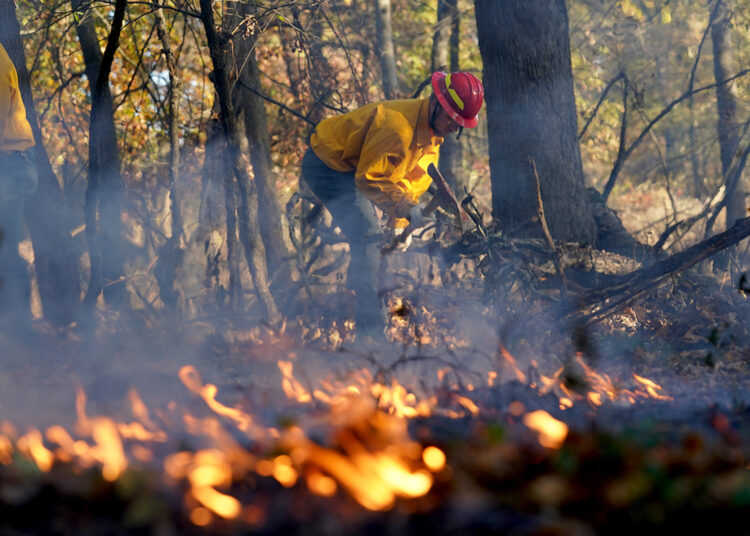(Butler, PA) They raked red and yellow leaves, flung twigs and branches, and severed roots and vines, to eliminate wildfire “fuel” and to establish a path of only mineral soil and the surfaces of immovable rocks.
To the west, unseen behind oaks and maples and aspens, and thickets of multiflora rose, were 10 other Butler County Community College students, raking and flinging and severing while creating their own hand line, a skill required to earn national certifications that could enhance their employability.
It was only after students in BC3’s park and recreation management career program finished the hand line – a measure intended to prevent a wildfire’s progress – that a remote tract of the college’s 330-acre main campus in Butler Township was set ablaze during a controlled burn exercise.
“It’s good that they do a project like this,” Jake Whitehead, a forest technician with the state Department of Conservation and Natural Resources’ Bureau of Forestry, said while students practiced wildland firefighting skills.
Students enrolled in a BC3 forestry class had the opportunity to earn National Wildfire Coordinating Group certifications in S-190 Introduction to Wildland Fire Behavior and in S-130 Firefighter Training after being assessed by the state Bureau of Forestry.
“Our preference is to hire folks with this training and these certifications already."
Jim Forsythe, BC3 grad and fire management officer, U.S. Fish and Wildlife Service, Lewistown, Mt.

“This is pretty unique”
Jim Forsythe is a fire management officer with the U.S. Fish and Wildlife Service at the 1.1 million-acre Charles M. Russell National Wildlife Refuge in Lewistown, Mt.
The former Butler County resident and his staff are responsible for all fire management activities on all U.S. Fish and Wildlife Service lands within Montana.
“There’s a lot of competition now” for positions with the federal agency, said Forsythe, a 2000 BC3 park and recreation management graduate. “Our preference is to hire folks with this training and these certifications already. That way we don’t have to spend the time and effort to get them through it.”
The park and recreation management program at BC3 is the only offered by Pennsylvania’s 15 community colleges, and prepares graduates for careers as law officers, park managers, park rangers and other options.
It is possible that a student could complete a bachelor’s degree program entirely at a college or university without the curriculum offering an opportunity to earn National Wildfire Coordinating Group certifications, said Chris Calhoun, coordinator of BC3’s program.
“This is just another aspect of foundational-level training,” Calhoun said, “that can make them marketable for employment in the profession.”
Hannah Baker is a BC3 park and recreation management student from Ford City whose career goal is to become a park ranger.
“I had looked into different colleges and universities, and career paths and degrees throughout high school,” Baker said, “and this is pretty unique.”
“A really good opportunity” at BC3
Bailey Kondos was also among BC3 students from Allegheny, Armstrong, Beaver, Butler, Jefferson, Lawrence and Venango counties to create the hand line with council rakes, McLeod tools and Pulaski axes, and to learn other techniques to extinguish a wildland fire.
“It’s something different that you are not going to get everywhere,” said Kondos, of Evans City.

“BC3 definitely provides a really good opportunity to learn different skills that you’re not going to get at a lot of places. BC3 puts a lot of emphasis on the programs it offers so that you really do get the training that you are looking for.”
Said Calhoun: “Students get the best learning experience by actually working with what they are going to deal with.”
More than 1,500 wildfires burned 3,033 acres in Pennsylvania in 2020, according to DCNR, with nearly all caused by humans.
“If a fire would happen,” said Nathan Maxwell, of New Castle, whose goal is to become a park ranger, “I will already be educated on how to start the process to put the fire out.”
The total damage and cumulative economic loss for the 2021 wildfire season is expected to be between $70 billion and $90 billion in the United States, AccuWeather founder and CEO Dr. Joel N. Myers said in October.
“Put out the fire ourselves”
Objectives for students pursuing the introduction to wildland fire behavior certification include describing the basic terminology used in wildland fire; identifying key characteristics of wildland fire environmental components such as fuels, weather and topography; and recognizing how alignment of fuels, weather and topography can increase the potential for extreme fire behavior.
“Being situationally aware of the different elements of weather and the wind change,” Maxwell said. “They can all have impacts on the fire.”
Objectives for students pursuing the firefighter training certification include describing the standards, tools and equipment, and various methods used in fireline construction; describing the methods for extinguishing a fire with or without the use of water; and demonstrating the ability to construct a fireline to required standards using various methods, tools and equipment, and techniques.
“Your ticket to potentially get the job,” Calhoun said.
“I don’t know of other schools in the area that get to do something like this.”
Aleena Hohn, of Butler, BC3 park and recreation management student
Students can get all the foundational information in a classroom, Calhoun said, “and that’s what we always do. But you don’t know what it’s like to put in a hand line until you get the tools in your hand and actually work together. You can’t simulate smoke. They have to demonstrate those skills. You can’t explain how hard the work is until you are actually out here doing it.”
BC3 students learned how to create an indirect attack by establishing the hand line and by using a dripped gasoline-diesel fuel mixture to set a fire just within the hand line, “so that when the two fires come together, there are no more fuels left,” Calhoun said.
They also learned to create a direct attack by pulling flaming material into a previously burned area, and with the use of portable water tanks.
“We actually get to be out here,” said Dan Faller, of Cranberry Township, whose goal is to work as a ranger, “and put out the fire ourselves.”
Added Aleena Hohn, of Butler, who wants to work as a ranger at Glacier National Park: “I don’t know of other schools in the area that get to do something like this.”
BC3’s park and recreation management program also offers students the opportunity to earn certifications that include first responder; CPR/AED for the professional rescuer; water rescue and emergency response; ice rescue and emergency response; advanced line systems rescue, and other certifications.
For more information, visit bc3.edu/prm





